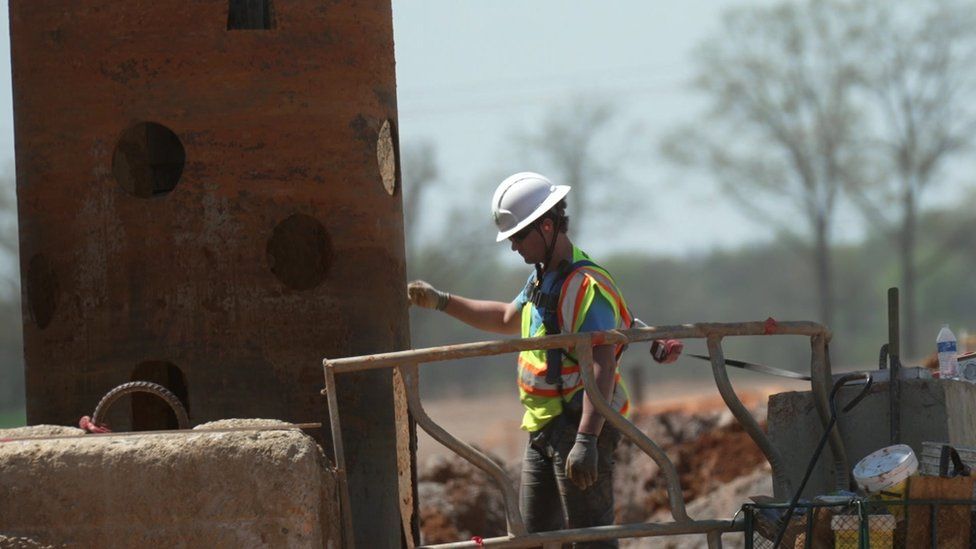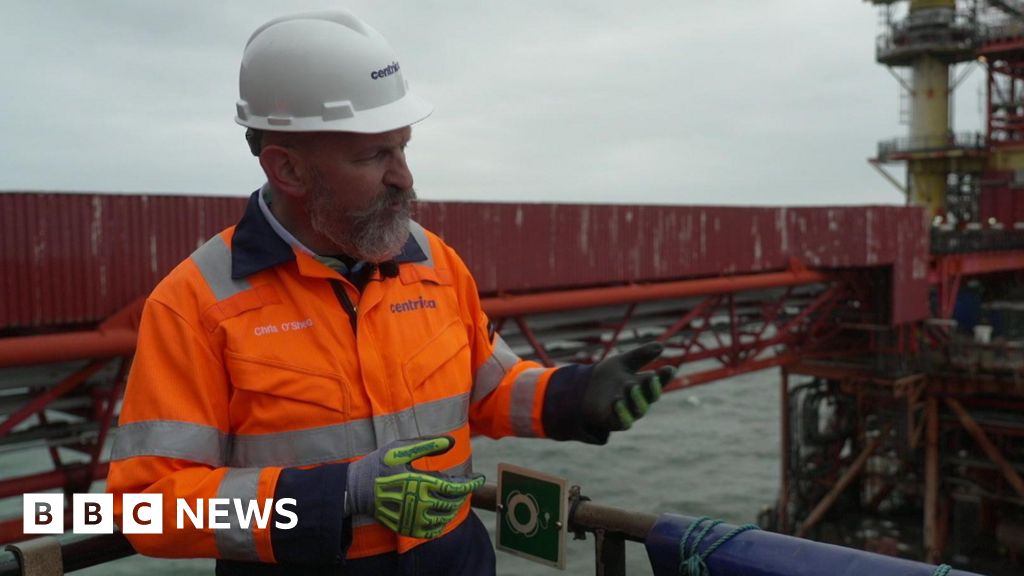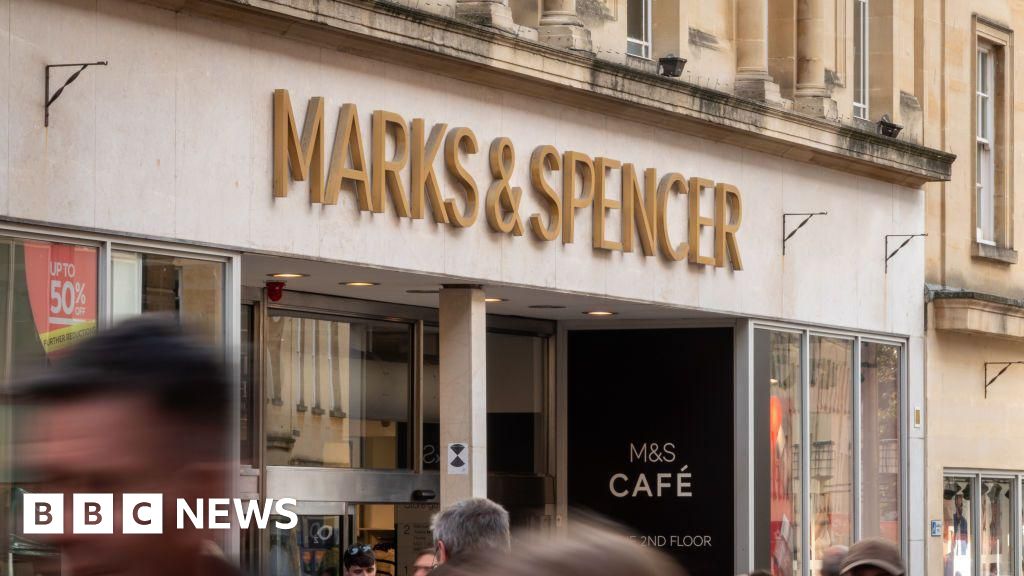ARTICLE AD BOX

By Faisal Islam
Economics editor
In the dusty cornfields of West Kentucky, an area which had long ago been abandoned as an industrial site is once again coming to life.
US manufacturer Ascend Elements has chosen the site to build a factory for electric car batteries made from recycled ones - an industry previously almost entirely based in China.
It has been drawn here by US incentives. The country is spending billions in new subsidies via loans and tax breaks targeted at green energy and vehicles.
Half of Ascend's initial $1bn build costs were covered by the US government under this new scheme, known as the Inflation Reduction Act (IRA).
The move is part of tectonic shifts emerging in where the world makes everything. It could spark a global trade war between Western allies, as the EU responds to the US plans in kind.
It is about those in the West refusing to bow to what was thought to be the inevitable ascent of China to being the world's biggest economy.
And it is about the livelihoods of those hoping to find employment in the industries of the future.
In Britain, it means there are choices to be made. A government preoccupied with Brexit and domestic political turmoil may have missed the start of a carve-up of future industries between giant trading blocs coming out of the pandemic.
The presumption that has dominated British politics for nearly half a century that governments do not "pick winners" in industry, is being severely tested by the fact that most G7 allies are doing just that, because of the push to reduce carbon emissions to net zero, post pandemic supply chain concerns and a wish to decouple from China.
'Standing on the sidelines'
John Neil, the boss of major UK manufacturing firm Unipart, says the combination of incentives offered by the US and similar government and regional plans could amount to $10 trillion - five times the size of the entire UK economy.
"The risk is that we're standing on the side lines while these big blocks compete… playing the game. I'm not sure that anybody [in UK politics] has calibrated the scale of change that that IRA and the Chips Act and the rest of it is going to have."
Mr Neil's publicly stated view reflects the private view of many in the UK car industry and beyond.
Unipart's John Neil says the UK risks standing on the side lines while the big blocks compete
The blueprint for the US plan was written during the pandemic. On the side lines of an IMF finance ministers meeting at the G7 in late 2021 the US Treasury Secretary Janet Yellen invented an entirely new word: "friendshoring".
It was a play on the efforts to "reshore" domestic production in critical industries, but including allies or "friends" in these rebuilt supply chains.
The French were cock-a-hoop when President Biden expanded upon the plan.
Tellingly, French finance minister Bruno Le Maire, back then talked about reducing dependence, not just on China, but on East Asian allies too.
The year before, Le Maire had been privately shocked when his officials reported that the supply chain for European electric car batteries was 85% dependent on China. For solar panels it was 95%.
Indeed that week, Biden had promised "never again" to be dependent on another nation in critical industries.
'America to lead the world?'
At a rally to promote his push in January President Biden told car workers: "You see I'm getting criticised internationally for focussing too much on America. To Hell with that. Where is it written that America can't lead the world in manufacturing again?"
Insiders say that although the focus is on green industries, the strategy is about supporting middle income jobs and wages in left behind areas - the regions where US presidential elections are decided.
Former US President Donald Trump took Kentucky by some margin in 2016, and promised to deregulate the industry, abandon climate change efforts and allow the mines to reopen. It did not happen.
Former miners are being paid union wages to fill in disused mines
Mining union boss Steve Earle recognises the targeted nature of the White House's investment drive, channelling new industries to set up close to where the coal mines shut down, going as far as paying former miners their union wages.
"We welcome the funding, we welcome the jobs, but I want President Biden to come from Washington DC down here and see first hand how these people have suffered for several years," he tells me.
While Mr Earle and his fellow miners seem no fans of Trump, they are sceptical of this new world of green technology and electric cars. "Range anxiety" in states as wide open and empty as Kentucky is still inherent, and especially so for the farmers.
The IRA and other policies are designed to capture the clean energy transition and channel the benefits of these changes to areas that have been left behind.
Treasury Secretary Janet Yellen calls it: "Modern supply side economics".
Supply side economics is typically seen as the opposite of what President Biden is doing right now. It focuses on the benefits of free trade, free markets, low taxes and deregulation.
Ms Yellen says that these policies have led a "race to the bottom".
Instead, she said in a speech last year: "Essentially, we aren't just focused on achieving a high, top-line growth number that is unsustainable - we are instead aiming for growth that is inclusive and green."
Strategy change
Washington insiders say there is an important change in strategy on environmental policy. Where as climate policy had long focused on the stick of regulation, such as capping emissions, it is now focused on the carrot of incentives, on a massive scale. This has brought business on board.
To criticism around the world that it is diverting investment from Europe and Asia to the US, deputy Treasury Secretary Wally Adeyemo says the US wants the rest of the world to follow suit, and praises Canada which has just announced similar extraordinary incentives for electric car makers.
He acknowledges there are "Made in America" clauses but says they represent a "small element" of the support package.
Wally Adeyemo praised Canada for introducing similar incentives to the US for its electric car makers
The EU Trade Commissioner Valdis Dombrovskis points out that EU nations would not have dreamt of excluding US-made Tesla from their electric car subsidies.
"Many EU member states also have subsidy schemes for electric vehicles, but they are non-discriminatory. What the US is doing... discriminating against other producers, is also making it... more inefficient in terms of green transition, because the best technology will not always be available".
One European leader told me the US had said the targeting of European industry was all a "giant accident", and was not meant "aggressively".
In the US, insiders said the IRA had been created by Biden's environment team rather than his trade team, who just assumed there was already a relevant trade deal in place with the EU. There was not.
The policy aim was to ensure that EU producers were given the same allowances as other allies such as Canada. If there were subsidy wars, however, the big EU nations would be able to compete, and side line the smaller ones, creating significant pressures on the European single market.
So where does this all leave the UK? Not formally involved in the US-EU talks.
Business and Trade Secretary Kemi Badenoch had "compared notes" with Dombrovskis. There could be a minerals agreement to help UK car exporters benefit from the US car incentives.
The official line articulated by both the Chancellor and the Energy Secretary is that the US is playing catch up with Europe and the UK on climate change, and that the UK uses double the proportion of renewables as the US.
But the language used by government appears to be evolving. Just last month cabinet ministers described US plans as "protectionist" and "dangerous", and insisted the UK would not go "toe to toe" with the US.
But manufacturers have been spelling out the consequences of standing on the side lines in public, and even more so in private. Now there is some talk of focusing on target sectors, even the return of "industrial strategy" two years after the phrase was banished by Kwasi Kwarteng.
The government's self-imposed fiscal rule to aim for reducing national debt, limits room for manoeuvre and spending power.
Labour has embraced the language of a British "Inflation Reduction Act" but as yet has not committed significant new money to such plans.
Would the Shadow Chancellor Rachel Reeves want to announce a loosening of the purse strings that risked acceptance of a rising national debt in the economy? In the US, President Biden is facing pressure to cut from Congressional Republicans threatening debt limit legislation.
Britain's post-Brexit economic strategy has been to focus on areas of strength that might benefit from faster, more effective or lighter regulation outside the EU - life sciences, the city and AI.
Unipart operates in Europe, North America, Japan and Australia
But John Neil and others fear the UK is being squeezed between the US & EU in this new world, especially in industries which had been promised "levelling up".
The chancellor has said he awaits the EU response to the US push. This may reflect a calculation that the EU might not respond quite as hard as expected, given some splits.
But this is the crux of the dilemma. The US is engaged in a massive atypical economic intervention designed to change the map of global production, address left behind areas and the net zero challenge as well as reducing reliance on China. It is here to stay and other blocs, especially the EU, will respond and are already fast-tracking some subsidies.
So, the question is should the UK follow suit, and can it afford to follow suit? There are fears in industry the scale of the intervention elsewhere means that it is already too late.

 2 years ago
29
2 years ago
29








 English (US) ·
English (US) ·